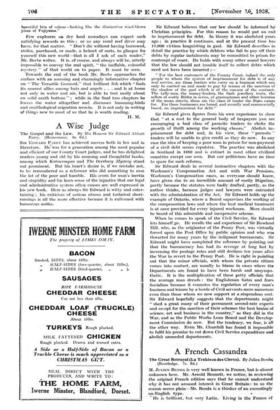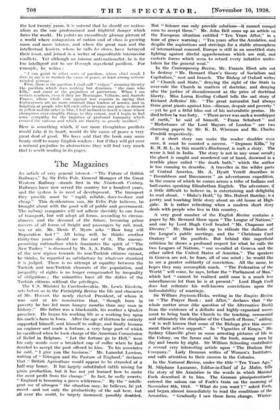A French Cassandra
The Great Betrayal (La Trahison des-Clercs). By Julien-Benda; (Boutledge. 7s. 6d.)
M. JULIEN BENDA is very well known in France, but is almost
unknown here. Mr. Arnold Bennett, we in reviewing the original French edition -Says that -he cannot understand why it has nbt amused interest in Great Britain : to us the reason seems plain—Mr. Benda is a thinker of an exceedingly
un-English type. ,-- • He is -brilliant,--but very Latin. Living in the France of
the last twenty years, it is natural that he should see nation- alism as the one predominant and frightful danger which fates the world. Ile paints an exceedingly gloomy picture of a world where antagonism of nation and of class is growing More and more intense, and where the great men and the intellectual leaders, whom he calls ice clercs, have betrayed their trust, and joined in a welter of unprofitable internecine conflicts. Yet although an intense anti-nationalist, he is far too intelligent not to sec through superficial pacifism. For example, he writes : "I can point to other sorts of pacifism, whose chief result I i dare to say s to weaken the cause of peace, at least among serious- minded persons :-- - First, there is the pacifism I shall call "vulgar," meaning thereby the pacifism which does nothing but denounce '' the man who kills,' and sneer at the prejudices of patriotism. When I see certain teachers, even if they are Montaigne, Voltaire, and Anatole France, whose whole case against war consists in saying that highwaymen are no more criminal than leaders of armies, and in laughing at people who kill each other because one party is dressed in yellow and the other in blue, I feel inclined to desert a cause whose champions over-simplify things to this extent, and I begin to feel some sympathy for the impulses of profound humanity which Created the nations and which are thereby so grossly insulted." Here is something which, if our more thoughtless pacifists would take it to heart, would do the cause of peace a very great deal of good. We have said that the book may seem heady stuff to many English readers ; but if they will get over a- natural prejudice to abstractions they will find very much that is worth reading in its pages.













































 Previous page
Previous page